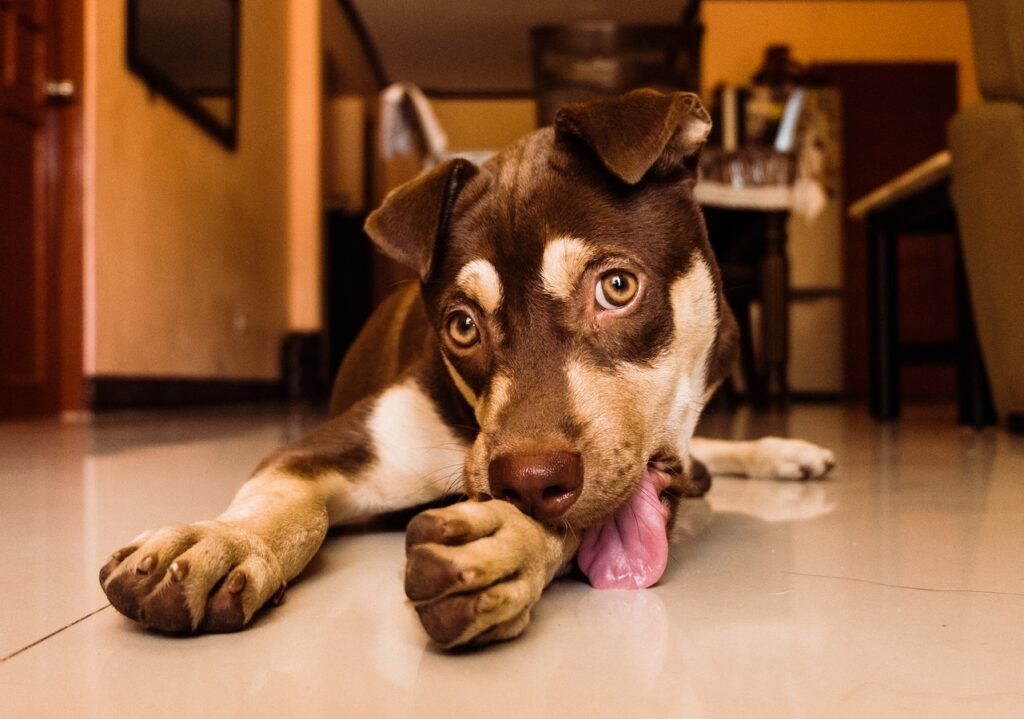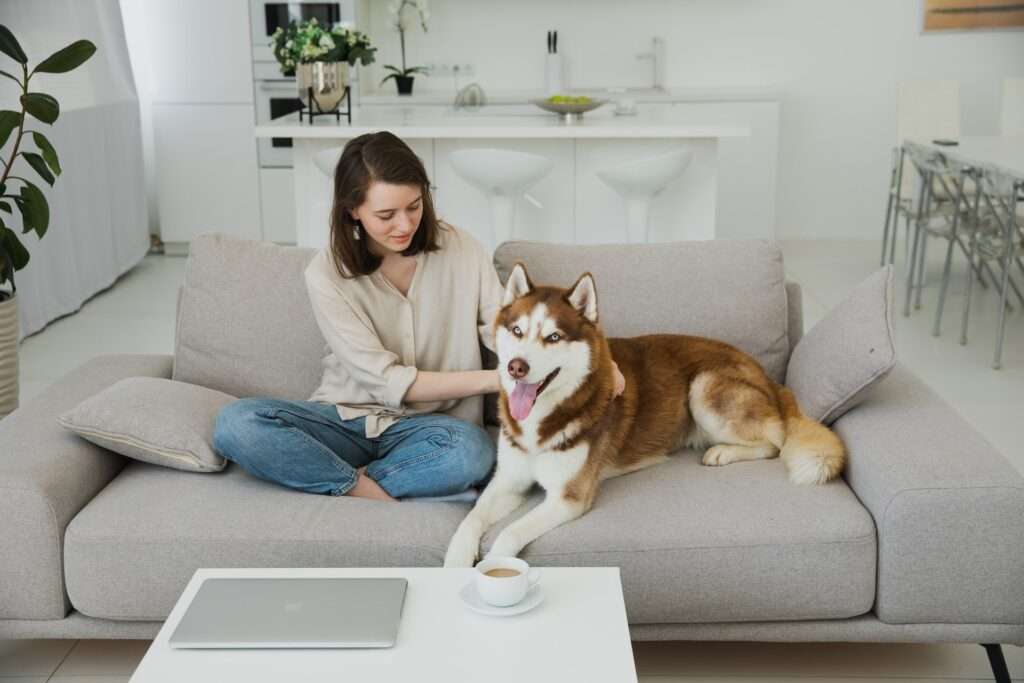Why Does My Dog Lick the Couch? Solving the Mystery Behind This Bizarre Behavior
Welcome to BarkLikeMeow, the ultimate resource for dog lovers seeking valuable insights into their furry companions’ behavior. In this article, we delve into a common question that plagues many dog owners: “Why does my dog lick the couch?” At first glance, this peculiar behavior may seem perplexing, but fear not—our dedicated team of experts is here to shed light on this mystery.
Understanding Canine Behavior

Canine instincts and natural behaviors:
When it comes to our beloved pooches, there’s more to them than meets the eye. Dogs, descendants of their wild ancestors, possess instinctual traits deeply ingrained in their DNA. Grooming and self-care, for instance, are vital aspects of their natural behaviors. By licking themselves, dogs not only maintain their hygiene but also establish a connection with their primal instincts.
- The instinctual need for grooming and self-care: Licking is an intrinsic part of a dog’s grooming routine, allowing them to cleanse their fur, remove dirt, and maintain their skin’s health. It’s a habit passed down through generations, dating back to the days when dogs roamed the wild. For them, it’s a way of staying true to their ancestral roots while ensuring their own well-being.
- Exploring the role of scent and taste in a dog’s world: As we all know, dogs have a remarkable sense of smell. Their olfactory receptors are finely tuned, allowing them to perceive scents that are imperceptible to us humans. Licking various objects, including couches, enables dogs to capture and process scents in a way that only they can comprehend. Additionally, their taste buds play a significant role, providing them with a unique sensory experience.
The importance of behavioral observation:
As responsible pet parents, it is crucial for us to be attentive and observant of our furry companions. By keenly observing their behavior, we can gain valuable insights into their well-being and happiness. Recognizing unusual behaviors, such as excessive couch licking, is the first step towards understanding the possible reasons behind it.
- Recognizing unusual behaviors in dogs: Dogs communicate with us in their own silent language. It’s up to us to decipher their signals and decode their actions. Unusual behaviors, including persistent couch licking, may indicate an underlying issue that requires our attention. By honing our observational skills, we can provide the best care and address any potential concerns promptly.
- Differentiating between normal and problematic licking behaviors: While licking is a natural behavior for dogs, there’s a fine line between normal and problematic. Normal licking typically occurs as part of grooming or occasional exploration. Problematic licking, on the other hand, may manifest as an obsessive or compulsive behavior. Distinguishing between the two is vital in determining if further investigation or intervention is necessary.
Join us as we delve deeper into the appeal of couch licking, exploring its sensory allure and potential reasons behind this fascinating canine behavior. Together, let’s unlock the secrets behind why our dogs find couches so irresistibly lickable!
The Appeal of Couch Licking
Sensory experiences and textures:
Imagine the countless textures and sensations a dog encounters in its lifetime. From the plushness of carpets to the roughness of tree bark, their world is a tactile wonderland. Couches, with their diverse materials and surfaces, offer an array of sensory experiences that can captivate our canine companions.
- Exploring a dog’s tactile preferences: Just like humans have individual preferences for fabrics and textures, dogs also have their own tactile inclinations. Some dogs may be drawn to the softness of velvet couches, while others may relish the coarse feel of woven upholstery. Understanding your dog’s preferences can provide valuable insights into their couch licking behavior.
- The allure of different couch materials and their impact on licking behavior: Couches come in various materials, such as leather, microfiber, or fabric. Each material carries its unique scent, taste, and texture. Dogs, with their heightened senses, may find certain materials particularly intriguing, prompting them to engage in licking as a means of exploration or gratification. The interaction between the couch material and their senses can influence their inclination to lick.
Reinforcing the behavior:
Can our unintentional actions inadvertently reinforce our dog’s couch licking habit? Let’s explore the possibility of emotional reinforcement and how it can contribute to this behavior.
- Examining unintentional reinforcement: Dogs are keen observers of our behavior, and they quickly learn to associate actions with consequences. If, for instance, your dog receives attention or affection when they lick the couch, they may perceive it as a rewarding behavior. Even scolding or reprimanding can inadvertently reinforce the behavior, as any attention, positive or negative, becomes a form of acknowledgment.
- The possibility of emotional reinforcement: Dogs are emotional beings, and they seek comfort and reassurance from their human companions. Couch licking, for some dogs, may serve as a coping mechanism or a soothing ritual, providing them with a sense of security or alleviating stress. This emotional reinforcement can contribute to the persistence of the behavior, making it important to address the underlying emotional needs of our furry friends.
Common Reasons for Couch Licking

Medical causes:
Sometimes, couch licking can be a sign of underlying medical conditions that warrant attention. Let’s explore a few potential medical causes that may contribute to this behavior.
- Dry skin or allergies: Could it be an itchy situation? Dry skin or allergies can cause discomfort in dogs, leading them to seek relief through licking. Irritated skin may prompt them to target specific areas, including the couch, as they instinctively try to soothe the itchiness. Identifying and addressing the underlying skin conditions can alleviate the need for excessive licking.
- Nutritional deficiencies and imbalances: A closer look at diet: A well-balanced diet is essential for your dog’s overall health. Nutritional deficiencies or imbalances can manifest in various ways, including changes in their behavior. In some cases, dogs may resort to licking objects, such as couches, as a means of seeking additional nutrients or minerals. Consulting with a veterinarian to assess your dog’s diet can help identify any deficiencies and rectify them accordingly.
- Dental issues: Oral health concerns that may contribute to licking: Oral health problems, such as gum disease or toothaches, can trigger discomfort in dogs. Licking the couch may provide temporary relief or serve as a distraction from the underlying dental issues. Regular dental check-ups and proper oral hygiene can help address these concerns, alleviating the need for excessive licking.
Stay tuned as we dive into behavioral causes and explore the impact of stress, anxiety, boredom, and other factors that may contribute to your dog’s couch licking habit. Together, we’ll
Solutions and Remedies
Addressing medical concerns:
When dealing with couch licking, it’s essential to rule out any underlying medical issues. Seeking veterinary guidance is crucial in developing an effective plan to address your dog’s specific needs.
- Consulting a veterinarian for a thorough examination: Schedule a visit to your trusted veterinarian, who can conduct a comprehensive examination to identify any medical conditions contributing to the couch licking behavior. They will be able to recommend appropriate treatments or therapies tailored to your dog’s unique situation.
- Implementing appropriate treatment plans for identified medical issues: Following your veterinarian’s guidance, administer any prescribed medications, supplements, or topical treatments to address the underlying medical causes. By resolving these concerns, you can help alleviate your dog’s desire to lick the couch.
Behavioral modifications and training:
Incorporating behavioral modifications and training techniques can be instrumental in redirecting your dog’s couch licking behavior and providing them with alternative outlets.
- Recognizing and minimizing triggers for stress and anxiety: Stress and anxiety can contribute to excessive licking behaviors. Identifying and minimizing triggers, such as loud noises or unfamiliar people, can help create a calmer environment for your dog. Providing a safe and quiet space where they can retreat when feeling anxious can be beneficial.
- Providing mental and physical stimulation through exercise and enrichment: Boredom and lack of mental stimulation can lead to undesirable behaviors, including couch licking. Engage your dog in regular exercise sessions, interactive play, and mentally stimulating activities, such as puzzle toys or treat-dispensing games. Providing ample physical and mental outlets can redirect their energy and focus away from licking.
- Positive reinforcement techniques to redirect licking behavior: Positive reinforcement is a powerful tool in shaping your dog’s behavior. Whenever you catch your dog showing an alternative behavior to licking, such as chewing on an appropriate toy, praise and reward them. Redirecting their attention and reinforcing desirable behaviors will gradually replace the couch licking habit.
Environmental adjustments:
Making simple adjustments to your dog’s environment can help discourage couch licking and provide them with suitable alternatives.
- Using furniture covers or protective barriers: Covering the couch with a washable, waterproof cover or using protective barriers can create a physical deterrent for licking. These measures can help break the habit by limiting access to the couch’s tempting surfaces.
- Providing alternative outlets for licking, such as safe chew toys: Offering appropriate chew toys, such as rubber or nylon options, can redirect your dog’s oral fixation towards acceptable objects. Introduce a variety of textures and flavors to find the toys that captivate your dog’s interest the most.
- Ensuring a comfortable and stimulating living space for your dog: Create a living environment that caters to your dog’s comfort and mental well-being. Provide cozy bedding, interactive toys, and interactive feeding puzzles to keep them engaged and content. A happy and stimulated dog is less likely to resort to couch licking.
Seeking Professional Help

When to consult a professional:
In some cases, couch licking may persist despite your best efforts. It’s crucial to recognize when professional intervention is necessary to address the issue effectively.
- Persistent or severe licking behaviors that do not improve: If your dog’s couch licking persists or escalates despite implementing behavioral modifications and remedies, it’s time to seek professional help. A professional can provide a fresh perspective and offer advanced techniques to tackle the issue.
- Behavioral issues that interfere with your dog’s quality of life: When couch licking starts to impact your dog’s overall well-being or disrupt their daily routines, it’s essential to involve a professional. They can assess the situation holistically and develop a tailored plan to address the underlying causes and improve your dog’s quality of life.
Working with a professional dog trainer or behaviorist:
Collaborating with a professional dog trainer or behaviorist can be invaluable in resolving complex couch licking issues.
- Assessing the situation and developing a customized plan: A skilled trainer or behaviorist will conduct a thorough assessment of your dog’s behavior, environment, and triggers. Based on their findings, they will create a personalized plan that addresses the root causes and provides effective strategies to modify the behavior.
- Techniques and tools used in professional behavior modification: Professional behaviorists may employ various techniques, such as desensitization, counterconditioning, or reward-based training, to redirect your dog’s couch licking behavior. They may also recommend specific tools, such as head halters or training aids, to facilitate the training process. Working closely with a professional will maximize your chances of success.
Conclusion
At BarkLikeMeow, we strive to unravel the mysteries behind our furry friends’ behaviors, and today we embarked on a fascinating quest to understand why dogs lick couches. Through our exploration, we discovered that couch licking is a complex behavior influenced by a combination of innate instincts, sensory experiences, medical factors, and emotional needs.
By recognizing the appeal of different couch materials and their impact on our dogs’ senses, we gained insight into why they find couches so irresistibly lickable. We also explored the unintentional reinforcement that can inadvertently perpetuate this behavior and the importance of addressing our dogs’ emotional well-being.
Remember, every dog is unique, and patience, consistency, and understanding are key to addressing couch licking habits. Together, we can create a harmonious living space where our furry friends find fulfillment and joy in healthier and more appropriate activities.
Frequently Asked Questions
Is it bad for my dog to lick the couch?
Licking the couch itself is not necessarily harmful to your dog, but it can be a sign of underlying issues such as anxiety or boredom. Additionally, if your couch is treated with chemicals or has sharp edges that your dog could injure themselves on, it may be best to discourage the behavior.
How can I stop my dog from licking the couch?
The best way to stop your dog from licking the couch is to address the underlying cause of the behavior. This could include providing more mental and physical stimulation, addressing separation anxiety, or ensuring your dog is getting enough exercise. You can also try redirecting your dog’s attention with toys or treats, or using a deterrent spray to discourage licking.
Is it normal for dogs to lick furniture?
Yes, it is normal for dogs to lick furniture as part of their grooming routine or out of curiosity. However, excessive licking could be a sign of underlying issues and should be addressed if it becomes a habit.
Can licking the couch make my dog sick?
Licking the couch itself is unlikely to make your dog sick, but if there are any harmful chemicals or substances on the couch, your dog could ingest them and become ill. Additionally, if your dog is licking the couch due to anxiety or boredom, it could be a sign of a larger health issue that should be addressed.
Why does my dog only lick certain spots on the couch?
Dogs may lick certain spots on the couch due to the presence of food or other substances, or because the area has a particular scent that they find interesting. They may also be trying to mark their territory or seeking comfort in a particular spot.
Can licking the couch be a sign of a medical issue?
Yes, excessive licking of the couch or other objects could be a sign of an underlying medical issue such as digestive problems, allergies, or neurological disorders. If you suspect your dog’s licking behavior is abnormal, it’s best to consult with a veterinarian.
Is it safe for my dog to lick leather couches?
Licking a leather couch is generally safe for dogs, but it’s important to make sure the leather is not treated with harmful chemicals or substances. Additionally, if your dog chews on the leather, it could cause damage to the couch or pose a choking hazard.
Can I train my dog to stop licking the couch?
Yes, you can train your dog to stop licking the couch by providing alternative activities such as chew toys, increasing exercise and playtime, and rewarding good behavior. Consistency and positive reinforcement are key to successfully training your dog to stop unwanted behaviors.
What should I do if my dog continues to lick the couch despite my efforts to stop them?
If your dog continues to lick the couch despite your efforts to stop them, it may be a sign of an underlying issue such as anxiety or boredom. It’s best to consult with a veterinarian or animal behaviorist to address the issue and find a solution that works for you and your dog.
Can licking the couch lead to dental problems for my dog?
Licking the couch itself is unlikely to cause dental problems for your dog, but excessive licking could be a sign of stress or anxiety that could lead to other health issues. Additionally, if your dog is chewing on the couch or other objects, it could cause damage to their teeth or gums.




